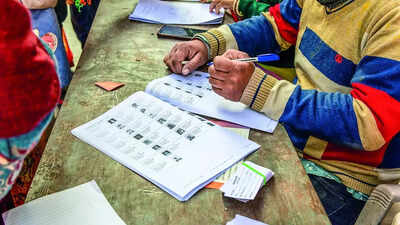ARTICLE AD BOX

File photo for representative purposes only.
NEW DELHI: The Election Commission on Monday ordered a "Special Revision" of electoral rolls in Assam, with the final voter list scheduled for publication on February 10, 2026. In its instructions to the state’s chief electoral officer, the poll panel said January 1, 2026 would be the qualifying date for the revision exercise.
Officials said the Special Revision falls between the annual special summary revision and the Special Intensive Revision (SIR) of electoral rolls in terms of scale and intensity.Assam chief minister Himanta Biswa Sarma welcomed the Election Commission’s decision and assured full cooperation from the state administration. "The Govt of Assam welcomes the Election Commission of India's decision to undertake a Special Revision of the electoral rolls with 01.01.2026 as the qualifying date," he posted on X.
"This will help ensure clean, updated and accurate electoral rolls for all eligible citizens. Assam will extend full cooperation to the @ECISVEEP to complete the revision in a transparent and time-bound manner," he added.
How is Special Revision different from SIR?
According to officials, the Special Revision stands somewhere between the annual special summary revision and the Special Intensive Revision (SIR) of electoral rolls.A Special Revision is a focused exercise aimed at updating and correcting the rolls without undertaking a full-scale enumeration.
It is designed to strengthen accuracy and address gaps in the list in a structured but moderate manner. A Special Intensive Revision, however, is a far more rigorous and exhaustive process. It involves deeper verification, multiple checks, intensive field work and a higher degree of scrutiny, usually deployed when major corrections or cleansing of the rolls are required. The Special Revision ordered for Assam is therefore more extensive than a routine summary revision but not as demanding as a full SIR."It is in a way an upgrade of special summary revision... instead of enumeration forms, booth-level officers will verify electors on a pre-filled register," a senior functionary explained.According to the schedule, door-to-door verification will be carried out from November 22 to December 20. The integrated draft electoral roll will be published on December 27, and the final roll on February 10 next year.For field verification, booth level officers (BLOs) will be issued a pre-filled register containing the details of existing electors in their respective parts for house-to-house verification.
Each household will serve as the basic unit for confirming or correcting voter details through direct interaction with residents or the head of the family.The poll panel clarified that the details of D-Voters (doubtful voters) will not be included in the BLO register as no verification is required in their case. D-Voters are individuals flagged for lacking valid citizenship documents under the Foreigners Act, 1946, and are identified through special tribunals. Although they do not receive voter cards, their particulars, such as name, age and photograph, will continue to be carried forward to the draft electoral roll without alteration. Any change, including removal, can only be made “upon receipt of an order from the competent Foreigners' Tribunal or an appropriate court of law”, the Commission emphasised.Last month, the EC ordered SIR for Chhattisgarh, Goa, Gujarat, Kerala, Madhya Pradesh, Rajasthan, Tamil Nadu, Uttar Pradesh, West Bengal, Puducherry, the Andaman and Nicobar Islands, and Lakshadweep.
Among these, Tamil Nadu, Puducherry, Kerala and West Bengal are set for elections in 2026. Elections in Assam are also due next year. Chief Election Commissioner Gyanesh Kumar recently said, "A special order will be issued by the Election Commission to hold SIR in Assam." He added that "Under the Citizenship Act, there are separate provisions for citizenship in Assam. Under the supervision of the Supreme Court, the exercise of checking citizenship is about to be completed. The June 24 SIR order was for the entire country. Under such circumstances, this would not have applied to Assam.
"

 1 hour ago
4
1 hour ago
4









 English (US) ·
English (US) ·